Bob Dole
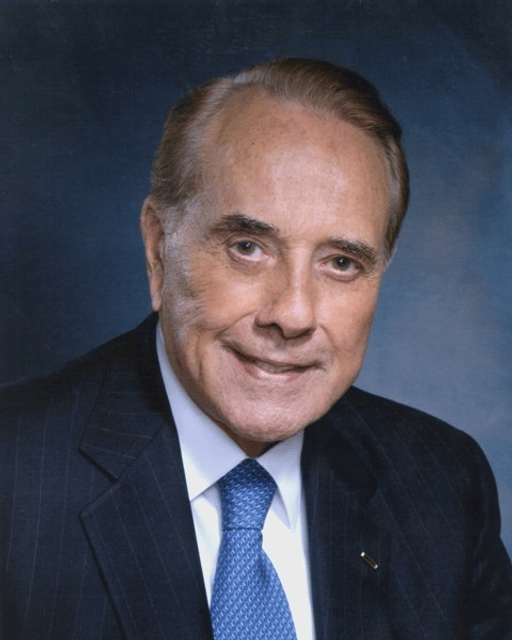
Bob Dole

Bob Dole | |
|---|---|
| Senate Majority Leader | |
| In office January 3, 1995 – June 11, 1996 | |
| President | Bill Clinton |
| Deputy | Trent Lott |
| Preceded by | George Mitchell |
| Succeeded by | Trent Lott |
| In office January 3, 1985 – January 3, 1987 | |
| President | Ronald Reagan |
| Deputy | Alan Simpson |
| Preceded by | Howard Baker |
| Succeeded by | Robert Byrd |
| Senate Minority Leader | |
| In office January 3, 1987 – January 3, 1995 | |
| Deputy | Alan Simpson |
| Preceded by | Robert Byrd |
| Succeeded by | Tom Daschle |
| Leader of the Senate Republican Conference | |
| In office January 3, 1985 – June 11, 1996 | |
| Deputy | Alan Simpson Trent Lott |
| Preceded by | Howard Baker |
| Succeeded by | Trent Lott |
| Chair of the Senate Finance Committee | |
| In office January 3, 1981 – January 3, 1985 | |
| Preceded by | Russell Long |
| Succeeded by | Bob Packwood |
| Ranking Member of the Senate Agriculture Committee | |
| In office January 3, 1975 – January 3, 1979 | |
| Preceded by | George Aiken |
| Succeeded by | Jesse Helms |
| Chair of the Republican National Committee | |
| In office January 15, 1971 – January 19, 1973 | |
| Preceded by | Rogers Morton |
| Succeeded by | George H. W. Bush |
| United States Senator from Kansas | |
| In office January 3, 1969 – June 11, 1996 | |
| Preceded by | Frank Carlson |
| Succeeded by | Sheila Frahm |
| Member of the U.S. House of Representatives from Kansas | |
| In office January 3, 1961 – January 3, 1969 | |
| Preceded by | Wint Smith |
| Succeeded by | Keith Sebelius |
| Constituency | 6th district(1961–1963) 1st district(1963–1969) |
| Personal details | |
| Born | Robert Joseph Dole (1923-07-22)July 22, 1923 Russell, Kansas, U.S. |
| Political party | Republican |
| Spouse(s) | Phyllis Holden (m. 1948;div.1972) Elizabeth Hanford (m.1975) |
| Children | 1 daughter |
| Education | University of Kansas University of Arizona Washburn University (BA, LLB) |
| Signature | |
| Military service | |
| Allegiance | |
| Branch/service | |
| Years of service | 1942–1948 |
| Rank | |
| Unit | 10th Mountain Division |
| Battles/wars | World War II (WIA) |
| Awards | Bronze Star Purple Heart |
Robert Joseph Dole (born July 22, 1923) is a retired American politician, statesman,[3] and attorney who represented Kansas in the U.S House of Representatives from 1961 to 1969 and in the U.S. Senate from 1969 to 1996, serving as the Republican Leader of the United States Senate from 1985 until 1996. He was the Republican presidential nominee in the 1996 presidential election and the party's vice presidential nominee in the 1976 presidential election.
Born in Russell, Kansas, Dole established a legal career in Russell after serving with distinction in the United States Army during World War II. After a stint as Russell County Attorney, he won election to the House of Representatives in 1960. In 1968, Dole was elected to the Senate, where he served as Chairman of the Republican National Committee from 1971 to 1973 and Chairman of the Senate Finance Committee from 1981 to 1985. He led the Senate Republicans from 1985 to his resignation in 1996, and served as Senate Majority Leader from 1985 to 1987 and from 1995 to 1996. In his role as Republican leader, he helped defeat President Bill Clinton's health care plan.
President Gerald Ford chose Dole as his running mate in the 1976 election after Vice President Nelson Rockefeller withdrew from seeking a full term. Ford was defeated by Democrat Jimmy Carter in the general election. Dole sought the Republican presidential nomination in 1980 but quickly dropped out of the race. He experienced more success in the 1988 Republican primaries but was defeated by Vice President George H. W. Bush. Dole won the Republican nomination in 1996 and selected Jack Kemp as his running mate. The Republican ticket lost in the general election to Bill Clinton, making Dole the first person to be nominated for both president and vice president by one of the current major parties without winning election to either position. He resigned from the Senate during the 1996 campaign and did not seek public office again after the election.
Though he retired from public office, Dole has remained active in public life after 1996. He appeared in numerous commercials and television programs and served on various councils. In 2012, Dole unsuccessfully advocated Senate ratification of the Convention on the Rights of Persons with Disabilities. He initially supported Jeb Bush in the 2016 Republican primaries, but later became the only former Republican nominee to endorse Donald Trump, after Trump clinched the Republican nomination. Dole is currently a member of the advisory council of the Victims of Communism Memorial Foundation and special counsel at the Washington, D.C., office of law firm Alston & Bird.[4] On January 17, 2018, Dole was awarded the Congressional Gold Medal. He is married to former U.S. Senator Elizabeth Dole of North Carolina.
Bob Dole | |
|---|---|
| Senate Majority Leader | |
| In office January 3, 1995 – June 11, 1996 | |
| President | Bill Clinton |
| Deputy | Trent Lott |
| Preceded by | George Mitchell |
| Succeeded by | Trent Lott |
| In office January 3, 1985 – January 3, 1987 | |
| President | Ronald Reagan |
| Deputy | Alan Simpson |
| Preceded by | Howard Baker |
| Succeeded by | Robert Byrd |
| Senate Minority Leader | |
| In office January 3, 1987 – January 3, 1995 | |
| Deputy | Alan Simpson |
| Preceded by | Robert Byrd |
| Succeeded by | Tom Daschle |
| Leader of the Senate Republican Conference | |
| In office January 3, 1985 – June 11, 1996 | |
| Deputy | Alan Simpson Trent Lott |
| Preceded by | Howard Baker |
| Succeeded by | Trent Lott |
| Chair of the Senate Finance Committee | |
| In office January 3, 1981 – January 3, 1985 | |
| Preceded by | Russell Long |
| Succeeded by | Bob Packwood |
| Ranking Member of the Senate Agriculture Committee | |
| In office January 3, 1975 – January 3, 1979 | |
| Preceded by | George Aiken |
| Succeeded by | Jesse Helms |
| Chair of the Republican National Committee | |
| In office January 15, 1971 – January 19, 1973 | |
| Preceded by | Rogers Morton |
| Succeeded by | George H. W. Bush |
| United States Senator from Kansas | |
| In office January 3, 1969 – June 11, 1996 | |
| Preceded by | Frank Carlson |
| Succeeded by | Sheila Frahm |
| Member of the U.S. House of Representatives from Kansas | |
| In office January 3, 1961 – January 3, 1969 | |
| Preceded by | Wint Smith |
| Succeeded by | Keith Sebelius |
| Constituency | 6th district(1961–1963) 1st district(1963–1969) |
| Personal details | |
| Born | Robert Joseph Dole (1923-07-22)July 22, 1923 Russell, Kansas, U.S. |
| Political party | Republican |
| Spouse(s) | Phyllis Holden (m. 1948;div.1972) Elizabeth Hanford (m.1975) |
| Children | 1 daughter |
| Education | University of Kansas University of Arizona Washburn University (BA, LLB) |
| Signature | |
| Military service | |
| Allegiance | |
| Branch/service | |
| Years of service | 1942–1948 |
| Rank | |
| Unit | 10th Mountain Division |
| Battles/wars | World War II (WIA) |
| Awards | Bronze Star Purple Heart |
Early life and education
Dole was born on July 22, 1923, in Russell, Kansas, the son of Binta M. (née Talbott; 1904–1983) and Doran Ray Dole (1901–1975).[5] His father, who had moved the family to Russell shortly before Robert was born, earned money by running a small creamery. One of Dole's father's customers was the father of his future Senate colleague Arlen Specter.[6] The Doles lived in a house at 1035 North Maple in Russell and it remained his official residence throughout his political career.[7]
Dole graduated from Russell High School in the spring of 1941[8] and enrolled at the University of Kansas the following fall. Dole had been a star high school athlete in Russell, and Kansas basketball coach Phog Allen traveled to Russell to recruit him to play for the Jayhawks basketball team. While at KU, Dole played for the basketball team, the track team, and the football team. In football, Dole played at the end position, earning varsity letters in 1942 and 1944. In 1942 he was a teammate of former Tennessee Titans owner Bud Adams, Adams's only season playing football at Kansas.[9] While in college, Dole joined the Kappa Sigma Fraternity, and in 1970 was bestowed with the Fraternity's "Man of the Year" honor.[10] Dole's collegiate studies were interrupted by World War II, when he enlisted in the United States Army.[11]
Dole attended the University of Arizona from 1948 to 1949, before transferring to Washburn University and graduating with both undergraduate and law degrees in 1952.[12]
World War II and recovery
In 1942, Dole joined the United States Army's Enlisted Reserve Corps to fight in World War II, becoming a second lieutenant in the Army's 10th Mountain Division. In April 1945, while engaged in combat near Castel d'Aiano in the Apennine mountains southwest of Bologna, Italy, Dole was seriously wounded by German machine gun fire, being struck in his upper back and right arm. As Lee Sandlin describes, when fellow soldiers saw the extent of his injuries, all they thought they could do was to "give him the largest dose of morphine they dared and write an 'M' for 'morphine' on his forehead in his own blood, so that nobody else who found him would give him a second, fatal dose."[13]
Dole was transported to the United States, where his recovery was slow, interrupted by blood clots and a life-threatening infection. After large doses of penicillin were not successful, he overcame the infection with the administration of streptomycin, which at the time was still an experimental drug.[14] He remained despondent, "not ready to accept the fact that my life would be changed forever." He was encouraged to see Hampar Kelikian, an orthopedist in Chicago who had been working with veterans returning from war. Although during their first meeting Kelikian told Dole that he would never be able to recover fully, the encounter changed Dole's outlook on life, who years later wrote of Kelikian, a survivor of the Armenian Genocide, "Kelikian inspired me to focus on what I had left and what I could do with it, rather than complaining what had been lost." Dr. K, as Dole later came to affectionately call him, operated on him seven times, free of charge, and had, in Dole's words, "an impact on my life second only to my family."[15]
Dole recovered from his wounds at the Percy Jones Army Hospital. This complex of federal buildings, no longer a hospital, is now named Hart-Dole-Inouye Federal Center in honor of three patients who became United States Senators: Dole, Philip Hart and Daniel Inouye. Dole was decorated three times, receiving two Purple Hearts for his injuries, and the Bronze Star with "V" Device for valor for his attempt to assist a downed radioman. The injuries left him with limited mobility in his right arm and numbness in his left arm. He minimizes the effect in public by keeping a pen in his right hand.[16]
Political career
Dole ran for office for the first time in 1950 and was elected to the Kansas House of Representatives, serving a two-year term.[17] In 1952, he became the County Attorney of Russell County.[18] In 1960, Dole was elected to the United States House of Representatives from Kansas' 6th Congressional District.[19]
U.S. Senate

Dole meeting with President Nixon in 1969. Photo by Oliver F. Atkins.
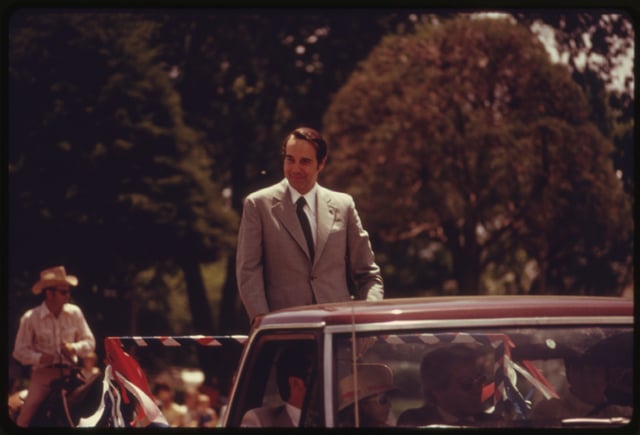
Dole in Emporia, Kansas, 1974. Photo by Patricia DuBose Duncan.
In 1968, Dole defeated Kansas Governor William H. Avery for the Republican nomination for the United States Senate to succeed retiring Senator Frank Carlson, subsequently being elected. Dole was re-elected in 1974, 1980, 1986, and 1992, before resigning on June 11, 1996, to focus on his Presidential campaign.[20]
Over time in the Senate, Dole was seen by some as having a moderate voting record.[24] During the 1970s, he partnered with Senator George McGovern to help pass legislation making food stamps more accessible.[25] In 1982, The New York Times referred to Dole as changing from "hard-line conservative" to "mainstream Republicanism".[26]
In a January 3, 1996 Briefing Room address, amid the ongoing United States federal government shutdowns of 1995–1996, President Clinton noted Dole as a lawmaker that was "working together in good faith" to reopen the government.[27]
Presidential politics
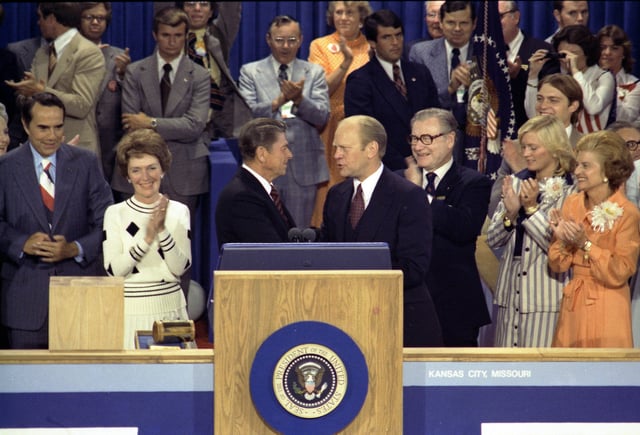
Bob Dole (far left) at the 1976 Republican National Convention in Kansas City with (from left) Nancy Reagan, Ronald Reagan, President Gerald Ford, Vice President Nelson Rockefeller, Susan Ford and Betty Ford

During 1988 primaries Dole won Iowa, Minnesota, South Dakota, Wyoming and his home state of Kansas George H. W. Bush Bob Dole Pat Robertson
In 1976, Dole ran unsuccessfully for Vice President on a ticket headed by President Gerald Ford. Incumbent Vice President Nelson Rockefeller had announced the previous November his retirement from politics rather than run for a full term as vice president, and Dole was chosen as Ford's running mate. Dole stated during the Vice Presidential debate with Walter Mondale, "I figured it up the other day: If we added up the killed and wounded in Democrat wars in this century, it would be about 1.6 million Americans — enough to fill the city of Detroit".[28]
Dole ran for the 1980 Republican presidential nomination, eventually won by Ronald Reagan. Despite Dole's national exposure from the '76 campaign, he finished behind Reagan, George H.W. Bush and four others in Iowa and New Hampshire, receiving only 2.5% and 0.4% of votes cast in those contests, respectively.[29] Dole ceased campaigning after New Hampshire and announced his formal withdrawal from the race on March 15th, instead being re-elected to his third term as Senator that year.[30]
Dole made another attempt in 1988, formally announcing his candidacy in his hometown of Russell, Kansas, on November 9, 1987.[31] At the ceremony, Dole was presented by the VFW with a cigar box, similar to the one he had used to collect donations for his war-related medical expenses, containing $7,000 in campaign donations.[32] Dole started out strongly by defeating Vice President George H. W. Bush in the Iowa caucus—Bush finished third, behind television evangelist Pat Robertson.[33]
However, Bush would defeat Dole in the New Hampshire primary a week later. After the returns had come in on the night of that primary, Dole appeared to lose his temper in a television interview with Tom Brokaw, saying Bush should "stop lying about my record", in response to a Bush commercial which accused Dole of "straddling" on taxes.[34]
Despite a key endorsement by Senator Strom Thurmond, Dole was defeated by Bush again in South Carolina in early March. Several days later, every southern state voted for Bush in a Super Tuesday sweep. This was followed by another loss in Illinois, which persuaded Dole to withdraw from the race.[35]
1996 presidential campaign
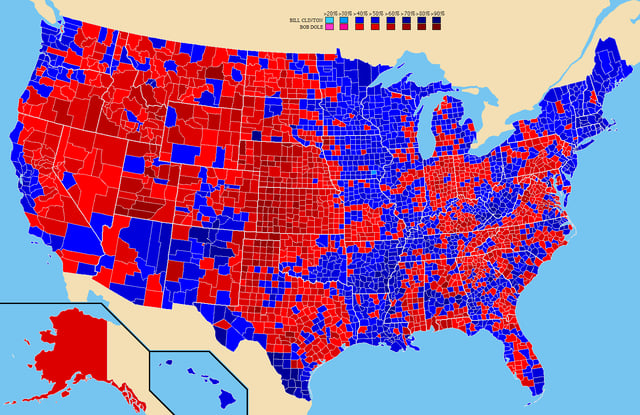
Election results by county. Bill Clinton Bob Dole
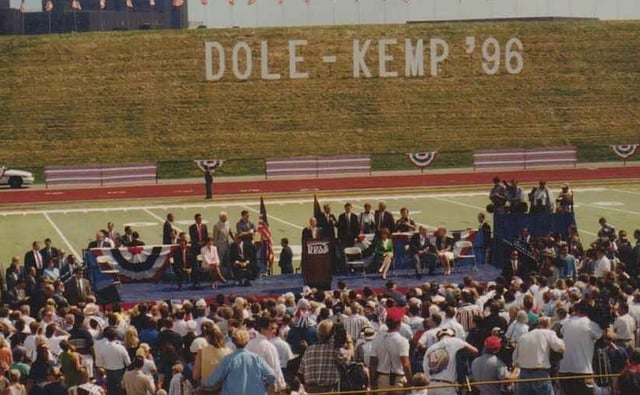
Dole–Kemp campaign rally at the State University of New York at Buffalo
The Republicans took control of both the Senate and House of Representatives in the 1994 mid-term elections, due to the fallout from President Bill Clinton's policies including his health care plan, and Dole became Senate Majority Leader for the second time. In October 1995, a year before the presidential election, Dole and Speaker of the House Newt Gingrich led the Republican-controlled Congress to pass a spending bill that President Clinton vetoed, leading to the federal government shutdown from 1995–96. On November 13, Republican and Democratic leaders, including Vice President Al Gore, Dick Armey, and Dole, met to try to resolve the budget and were unable to reach an agreement.[36][37] Due to Dole's need to campaign for the Republican presidential nomination, he wanted to solve the budget crisis in January 1996 despite the willingness of other Republicans to continue the shutdown unless their demands were met. In particular, as Gingrich and Dole had been seen as potential rivals for the 1996 Presidential nomination, they had a tense working relationship.[38] The shutdown was cited as having a role in Clinton's successful 1996 re-election by Clinton aide George Stephanopoulos.[39]
The popularity of the incumbent president, Bill Clinton, had improved greatly from 1994 to 1996 thanks to a booming economy as well as winning public opinion in the 1995 budget shutdown, so Clinton and vice president Al Gore faced no serious opposition in the Democratic primaries.[40] A few months before his death in April 1994, Richard Nixon warned Dole "If the economy's good, you're not going to beat Clinton."[41] Dole was the early front runner for the GOP nomination in the 1996 presidential race. At least eight candidates ran for the nomination. Dole was expected to win the nomination against underdog candidates such as the more conservative Senator Phil Gramm of Texas and more moderate Senator Arlen Specter of Pennsylvania. Pat Buchanan upset Dole in the early New Hampshire primary, however, with Dole finishing second and former Tennessee governor Lamar Alexander finishing third. Speechwriter Kerry Tymchuk remarked "Dole was on the ropes because he wasn't conservative enough".[40]
Dole eventually won the nomination, becoming the oldest first-time presidential nominee at the age of 73 years, 1 month (President Ronald Reagan was 73 years, 6 months in 1984, for his second presidential nomination), and would've succeeded Reagan as the oldest president to take office, as well as the first Kansas native to become president (as Dwight Eisenhower was born in Texas). Dole found the initial draft of the acceptance speech written by Mark Helprin as too hardline, so Kerry Tymchuk who was part of the "'Let Dole be Dole' crowd" revised the speech to cover the 'themes of honor, decency and straight talk. It included the following line, a swat at the all-or-nothing rookie Republicans who had been swept into Congress in the 1994 midterm GOP wave: "In politics honorable compromise is no sin. It is what protects us from absolutism and intolerance"'.[40]
In his acceptance speech, Dole stated, "Let me be the bridge to an America that only the unknowing call myth. Let me be the bridge to a time of tranquillity, faith, and confidence in action,"[42] to which incumbent president Bill Clinton responded, "We do not need to build a bridge to the past, we need to build a bridge to the future."[43] While on the campaign trail, after a speech, Dole was standing on a stage and leaned over to shake hands. He fell off the stage but was not injured.
Dole was the first sitting Senate Party Leader to receive his party's nomination for president. He hoped to use his long experience in Senate procedures to maximize publicity from his rare positioning as Senate Majority Leader against an incumbent President but was stymied by Senate Democrats. On June 11, 1996, Dole resigned his seat to focus on the campaign, saying he had "nowhere to go but the White House or home".[44]
As told in the Doles' joint biography, Unlimited Partners, speechwriter and biographer Kerry Tymchuk wrote "that he was going to make a statement. He was going to risk it all for the White House. He knew his time as leader was over. It would have been tough to come back [to the Senate as leader] if he lost in November. He knew it was time to move up or move out."[40]
Dole promised a 15% across-the-board reduction in income tax rates and made former Congressman and supply side advocate Jack Kemp his running mate for vice president. Dole found himself criticized from both the left and the right within the Republican Party over the convention platform, one of the major issues being the inclusion of the Human Life Amendment. Clinton framed the narrative against Dole early, painting him as a mere clone of unpopular then-House Speaker Newt Gingrich, warning America that Dole would work in concert with the Republican Congress to slash popular social programs, like Medicare and Social Security, dubbed by Clinton as "Dole-Gingrich".[45] Dole's tax-cut plan found itself under attack from the White House, who said it would "blow a hole in the deficit".[46]
Concerns over Dole's age and lagging campaign were exemplified by a memorable incident on September 18, 1996. At a rally in Chico, California, he was reaching down to shake the hand of a supporter, when the railing on the stage gave way and he tumbled four feet. While only minorly injured in the fall, "the televised image of his painful grimace underscored the age difference between him and Clinton" and proved an ominous sign for Republican hopes of retaking the White House.[48][49][50]
During the latter half of October 1996, Dole made a campaign appearance with Heather Whitestone, the first deaf Miss America, where both of them signed "I love you" to the crowd. Around that time, Dole and his advisers knew that they would lose the election, but in the last four days of the campaign they went on the "96-hour victory tour" to help Republican Congressional candidates.[51]
Dole lost, as pundits had long expected, to incumbent President Bill Clinton in the 1996 election. Clinton won in a 379–159 Electoral College landslide, capturing 49.2% of the vote against Dole's 40.7% and Ross Perot's 8.4%.[52] As Richard Nixon had predicted to Dole a few months before his death in April 1994, Clinton was able to ride a booming economy to a second term in the White House.[41]
Dole is the last World War II veteran to have been the presidential nominee of a major party. During the campaign, Dole's advanced age was brought up, with critics stating that he was too old to be President.
In his election night concession speech, Dole remarked "I was thinking on the way down in the elevator – tomorrow will be the first time in my life I don't have anything to do."[51] Dole later wrote "I was wrong. Seventy-two hours after conceding the election, I was swapping wisecracks with David Letterman on his late-night show".[41] During the immediate aftermath of his 1996 loss to Clinton, Dole recalled that his critics thought that "I didn't loosen up enough, I didn't show enough leg. They said I was too serious . . . It takes several months to stop fretting about it and move on. But I did." Dole remarked that his decisive defeat to Clinton made it easier for him to be "magnanimous". On his decision to leave politics for good after the 1996 presidential election campaign, despite his guaranteed stature as a former Senate leader, Dole stated "People were urging [me] to be a hatchet man against Clinton for the next four years. I couldn't see the point. Maybe after all those partisan fights, you look for more friendships. One of the nice things I've discovered is that when you're out of politics, you have more credibility with the other side . . . And you're out among all kinds of people, and that just doesn't happen often for an ex-president; he doesn't have the same freedom. So it hasn't been all bad."[53]
Post-political career

2005, Dole speaking at the 60th Anniversary of VE Day
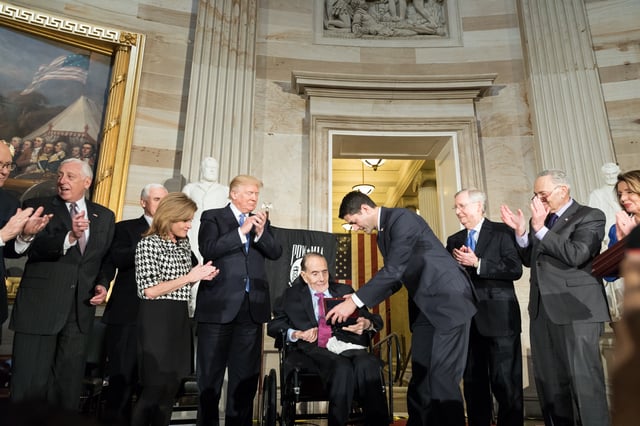
Dole is presented with the Congressional Gold Medal
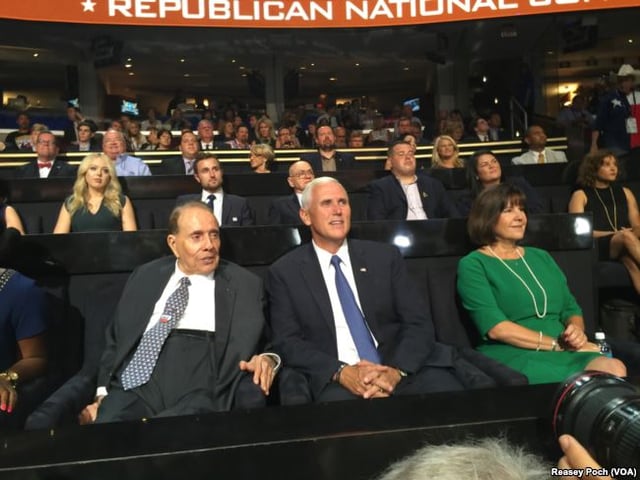
Dole sits with Mike Pence at the 2016 Republican National Convention
The 1996 presidential election, despite ending in a loss, opened up numerous opportunities for Dole owing in part to his sense of humor. He has engaged in a career of writing, consulting, public speaking, and television appearances. Dole was the first defeated presidential nominee to become a political celebrity.[53]
He became a television commercial spokesman for such products as Viagra, Visa, Dunkin' Donuts and Pepsi-Cola (with Britney Spears), and as an occasional political commentator on the interview program Larry King Live, and has been a guest a number of times on Comedy Central's satirical news program, The Daily Show with Jon Stewart. Dole was, for a short time, a commentator opposite Bill Clinton on CBS's 60 Minutes. Dole guest-starred as himself on NBC's Brooke Shields sitcom Suddenly Susan in January 1997 (shortly after losing the presidential election). He also made a cameo appearance on Saturday Night Live, parodying himself in November 1996.[41]
From 1998 to 2002, Dole was head of the Federal City Council, a group of business, civic, education, and other leaders interested in economic development in Washington, D.C.[54]
After leaving office, Dole joined the Washington, D.C. firm Verner, Liipfert, Bernhard, McPherson and Hand, where he was a registered lobbyist on behalf of foreign governments (including Kosovo, Taiwan, and Slovenia); the American Society of Anesthesiologists; Tyco; and the Chocolate Industry Coalition.[55] In 2003, after Verner, Liipfert was acquired by Piper Rudnick,[55][56] Dole joined the Washington, D.C. law and lobbying firm Alston & Bird LLP, where he continued his lobbying career.[57][58][59] While working for Alston & Bird, Dole has been registered as a foreign agent in order to represent the government of Taiwan in Washington.[57][58]
Dole has written several books, including one on jokes told by the Presidents of the United States, in which he ranks the presidents according to their level of humor.
The Robert J. Dole Institute of Politics, housed on the University of Kansas campus in Lawrence, Kansas, was established to bring bipartisanship back to politics. The Institute, which opened in July 2003 to coincide with Dole's 80th birthday, has featured such notable speakers as former President Bill Clinton and former New York City Mayor Rudy Giuliani.
Dole's legacy also includes a commitment to combating hunger both in the United States and around the globe. In addition to numerous domestic programs, and along with former Senator George McGovern (D-South Dakota), Dole created an international school lunch program through the George McGovern-Robert Dole International Food for Education and Child Nutrition Program, which, funded largely through the Congress, helps fight child hunger and poverty by providing nutritious meals to children in schools in developing countries.[60][61] This internationally popular program would go on to provide more than 22 million meals to children in 41 countries in its first eight years.[62][63] It has since led to greatly increased global interest in and support for school-feeding programs — which benefit girls and young women, in particular — and won McGovern and Dole the 2008 World Food Prize.[63]
In 2004, on the Larry King show, Dole had a heated exchange with Democratic presidential primary candidate Wesley Clark in which Dole correctly predicted that Clark would lose the New Hampshire primary and other primaries.
On September 18, 2004, Dole offered the inaugural lecture to dedicate the University of Arkansas Clinton School of Public Service, during which he chronicled his life as a public servant and also discussed the importance of public service in terms of defense, civil rights, the economy, and in daily life.[64] Dole also gave the 2008 Vance Distinguished Lecture at Central Connecticut State University.[65]
On April 12, 2005, Dole released his autobiography One Soldier's Story: A Memoir (ISBN 0-06-076341-8), which talks of his World War II experiences and his battle to survive his war injuries.
Dole also served as a director for the Asia Universal Bank, a bank domiciled in Kyrgyzstan during the discredited Bakiyev presidential regime which was subsequently shut down owing to its involvement in money laundering.[66]
In 2007, President George W. Bush appointed Dole and Donna Shalala, former Secretary of Health and Human Services, as co-chairs of the commission to investigate problems at Walter Reed Army Medical Center.[67][68] That same year, Dole joined fellow former Senate majority leaders Howard Baker, Tom Daschle, and George Mitchell to found the Bipartisan Policy Center, a non-profit think-tank that works to develop policies suitable for bipartisan support.[69]
Dole appears in the 2008 documentary on political consultant and Republican strategist Lee Atwater, Boogie Man: The Lee Atwater Story. In the film, Dole says, "I don't comment on Atwater," and, additionally, "This isn't politics, this is garbage."
On January 26, 2012, Dole issued a letter critical of Newt Gingrich, focusing on Dole and Gingrich's time working together on Capitol Hill.[70] The letter was issued immediately before the Florida primary. Dole endorsed Mitt Romney for the Republican nomination.[71]
Dole has cited the association made between himself and Gingrich as fellow Congressional leaders in Democratic advertisements as a key factor for his 1996 presidential defeat. [72]
On December 4, 2012, Dole made an appearance on the Senate floor to advocate ratification of the Convention on the Rights of Persons with Disabilities. Democratic Senator John Kerry explained: "Bob Dole is here because he wants to know that other countries will come to treat the disabled as we do." The Senate rejected the treaty by a vote of 61–38, less than the 66 required for ratification. Many Republican senators voted against the bill, fearing it would interfere with American sovereignty.[73]
In early 2014, Dole began a reunion tour of his home state of Kansas, in which he sought to visit each of the state's 105 counties. At each stop he spent approximately an hour speaking with old friends and well-wishers.[74]
Dole endorsed and campaigned for incumbent Kansas Senator Pat Roberts during the latter's 2014 re-election bid.[75]
In 2015, Dole endorsed former Florida governor Jeb Bush in his presidential campaign. After Bush ended his campaign following the South Carolina primary, Dole endorsed Florida senator Marco Rubio's campaign.[76] During the campaign, Dole criticized Texas senator Ted Cruz, stating that he "question[ed] his allegiance to the party" and that there would be "wholesale losses" if he were to win the Republican nomination.[77] Dole endorsed Donald Trump after the latter clinched the Republican nomination,[78] and Dole was the lone former Republican presidential nominee to attend the 2016 Republican National Convention.[79] Dole had attended every GOP convention since 1964, and did not consider skipping the 2016 edition even though Trump's politics were closer to that of Dole's 1996 primary rival Pat Buchanan.[40]
Former Dole advisers, including Paul Manafort, played a major role in Trump's presidential campaign.[79] Following Trump's electoral victory, Dole coordinated with the Trump campaign and presidential transition team to set up a series of meetings between Trump's staff and Taiwanese officials as well as assisting in successful efforts to include favorable language towards Taiwan in the 2016 Republican Party platform.[80] In February 2016 Dole donated $20,000 to help pay for a camp for children with cancer in central Kansas.[81]
Dole, age 95, using a wheelchair, stood-up with the help of an aide at the funeral of George H.W. Bush in the United States Capitol rotunda on December 4, 2018, and saluted to pay his respects to the late 41st President of the United States.[83]
Awards
On January 18, 1989, Dole was presented with the Presidential Citizens Medal by President Reagan.
On January 17, 1997, Senator Dole was presented the Presidential Medal of Freedom by President Bill Clinton for his service in the military and his political career. In his acceptance remarks in the East Room of the White House, Dole remarked "I had a dream that I would be here this historic week receiving something from the president — but I thought it would be the front-door key".[41]
In 1997, Dole received the U.S. Senator John Heinz Award for Greatest Public Service by an Elected or Appointed Official, an award given out annually by Jefferson Awards.[84]
In October 2001, Dole received the Gold Good Citizenship award from the National Society of the Sons of the American Revolution.
Dole received the American Patriot Award in 2004 for his lifelong dedication to America and his service in World War II.
On September 30, 2015, the National Commemoration of the Armenian Genocide Centennial (NCAGC) honored former Senator Bob Dole with the organization's Survivor's Gratitude Award in the category of "Hero of Responsibility and Principle" for his tireless efforts in raising attention to the Armenian Genocide and its victims.[85]
For his lobbying efforts on behalf of Kosovo Albanians before, during and after the Kosovo War, in May 2017, Albanian President Bujar Nishani awarded Dole Albania's highest civilian honor, the National Flag Order medal, at a ceremony in Washington, D.C.[86]
On January 17, 2018, Dole was awarded the Congressional Gold Medal for his service to the nation as a "soldier, legislator and statesman."[87]
Honorary degrees
Dole has been awarded several honorary degrees. These include:
| Location | Date | School | Degree |
|---|---|---|---|
| September 27, 1969 | Washburn University | Doctor of Laws (LL.D) [88] | |
| May 18, 1985 | Washburn University | Doctor of Civil Laws (D.C.L.) [88] | |
| December 13, 1986 | University of Kansas | Doctorate [89] | |
| 1996 | Gallaudet University | Doctorate [90] | |
| December 14, 2011 | University of Kansas | Doctor of Laws (LL.D) [91] | |
| June 25, 2014 | University of New Hampshire | Doctorate [92] | |
| June 25, 2015 | Norwich University | Doctor of Public Administration (D.P.A.) [93] | |
| May 13, 2016 | Fort Hays State University | Doctor of Arts (D.Arts) [94] |
Personal life
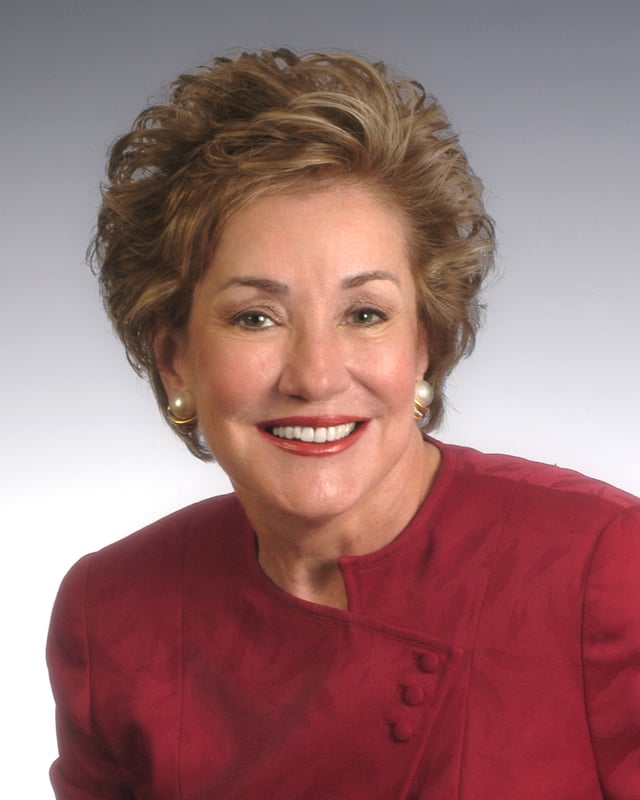
Dole's wife, former cabinet secretary and U.S. Senator Elizabeth Dole
Dole married Phyllis Holden, an occupational therapist at a veterans hospital, in Battle Creek, Michigan, in 1948, three months after they met. Their daughter, Robin, was born on October 15, 1954. Dole and Holden divorced January 11, 1972.[95] Holden died on April 22, 2008.
Dole met his second wife, Elizabeth, in 1972. The couple were married on December 6, 1975. They have no children.
Health issues
In 2001, Dole, at age 77, was treated successfully for an abdominal aortic aneurysm by vascular surgeon Kenneth Ouriel. Ouriel said Dole "maintained his sense of humor throughout his care."[101]
In recent years, Dole has struggled with health problems. In December 2004, he had a hip-replacement operation that required him to receive blood thinners. One month after the surgery, it was determined that Dole was bleeding inside his head. Dole spent 40 days at Walter Reed Army Medical Center, and upon release, his stronger arm, the left, was of limited use. Dole told a reporter that he needed help to handle the simplest of tasks, since both of his arms are injured. He undergoes occupational therapy for his left shoulder once a week, but doctors have told him that he might not regain total use of his left arm.
In 2009, Dole was hospitalized for an elevated heart rate and sore legs for which he underwent a successful skin-graft procedure. In February 2010, Dole was hospitalized for pneumonia after undergoing knee surgery. He spent ten months at Walter Reed Army Medical Center, recovering from the surgery, and experienced three bouts with pneumonia. He was released from the hospital in November 2010. In January 2011, however, Dole was readmitted to Walter Reed Army Medical Center and spent about six days there, being treated for a fever as well as a minor infection.
Dole was hospitalized in the latter part of November 2012 at Walter Reed National Military Medical Center, according to then-Senate Majority Leader Harry Reid.[102] On September 13, 2017, Dole was hospitalized at Walter Reed National Military Medical Center for low blood pressure.[103] He stayed for 24 hours before returning home.[104]
Electoral history
See also
Kemp Commission
Notable Freemasons